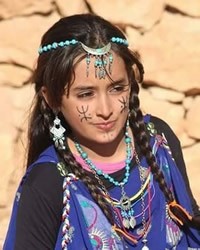The Shawiya are Berber shepherds living mainly on the Aures Plateau of the Atlas Mountains in northern Algeria and Tunisia. The Africans call this entire region of North Africa Maghrib. The Berber refer to themselves as Imazighen, or "free and noble men." This term has become an indicator of Berber identity and nationalism.
The inaccessible peaks of the Atlas Mountains have long served as a refuge for Berber tribes. These rugged mountains provided a base of resistance against the Romans, Vandals, Byzantine, and Arabs. However, Arab Muslims conquered the Maghrib between 670 and 700 A.D.
The Shawiya are one of the various Berber groups that have risen in Algeria to defend their identity. This tribe speaks the Tachawit language along with Algerian Arabic, the trade language. In general, they are sturdy, thrifty, hospitable, and lovers of the soil. They are also proud, shrewd, persistent, and loyal. In particular, a passion for independence is deeply ingrained in their culture. To this day, they crave independence from the more powerful Arabs.
The original inhabitants of the lowlands of the Sahara Desert were greatly influenced by Arab culture. The Shawiya, however, took refuge in the Atlas Mountains and were able to sustain and preserve their own language, culture, customs and social organization.
Today, most Shawiya are shepherds and farmers. Their staple crops include grains and fruits that are cultivated in the mountains. Along the edge of the desert, they live as nomads, migrating between the highlands and the desert. They primarily raise sheep and goats, and most also have a few mules and donkeys, which are used for transportation. During the winter, they move their herds to the warm plains, then to higher pastures during the spring and summer months.
Shawiya villages consist of close-knit, extended family groups, which trace their ancestry through male lineage. Many of the villages are located on the crests of hills. Although they move frequently, the Shawiya never leave the villages unattended. A few people stay behind to guard the granaries and to plant crops.
Traditionally, Berber local government consisted of a jamaa (village council), which included all adult males and legislated according to local custom and law. Arab efforts to modify that system were not very successful, and it has since continued to function alongside the civil government imposed by the state.
Although they accepted Islam as a new religion, the Berber also maintained their pre-Islamic cultural and ritual traditions. The acceptance of Islam and the adoption of Arabic ways never completely erased Berber culture. Although they are nominally Sunni Muslims, most Shawiya have little knowledge of the practices of the Koran and other dimensions of Middle Eastern Islam.
Opposition to the gospel is intense. Most of Algeria's various peoples, including the Shawiya, remain unreached and kept apart from the saving power of Jesus Christ.
Pray that God will save key leaders among the Shawiya who will boldly declare the gospel.
Ask God to raise up prayer teams who, through worship and intercession, will begin to break up the soil of the Shawiya hearts to receive the gospel.
Pray that strong local fellowships will form that will multiply into more fellowships.
Scripture Prayers for the Berber, Shawiya in Algeria.
https://www.britannica.com/topic/Shawiya
https://www.crwflags.com/fotw/flags/dz-sha.html
| Profile Source: Joshua Project |

























